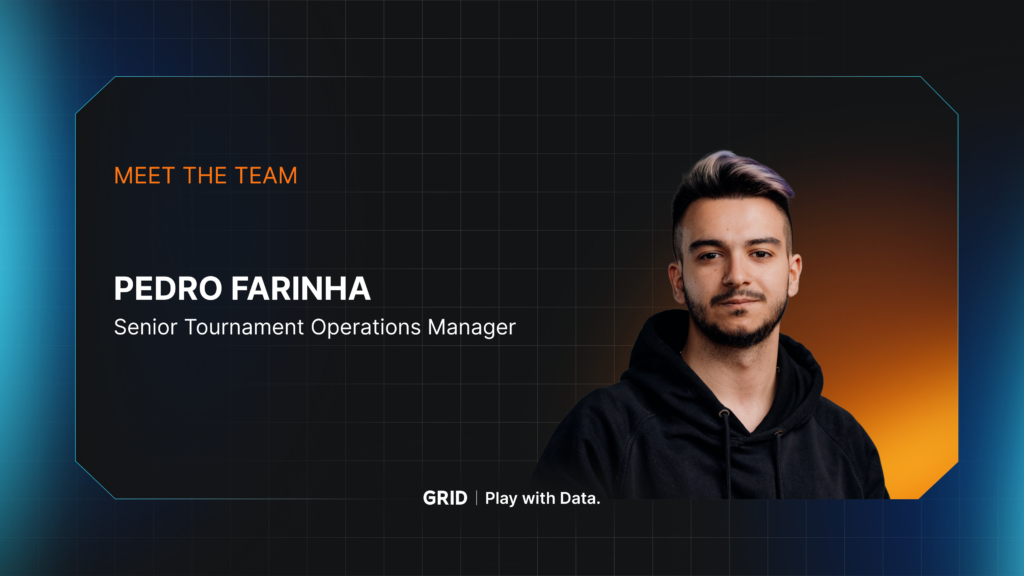In this month’s edition of Meet the Team we talked to Pedro Farinha, Senior Tournament Operations Manager, whose esports journey started by accident, but he never looked back. Keep reading to learn about his lessons from the Portuguese CS scene, the power of community feedback, and how building IKEA furniture fits into the picture.
1. You’ve been a part of the Portuguese esports scene from early on – what first got you into tournament operations, and how has that journey shaped your role at GRID?
Honestly, I got into Tournament Operations by accident. When I transitioned from CS 1.6 to CS:GO, I joined the K1CK Academy, on a low-tier Portuguese academy project. Because our team and others at the same level weren’t progressing in the main qualifiers, we decided to run our academy tournaments to get more competitive experience and keep that drive alive.
Over time, especially when external teams started reaching out to participate. I realized I genuinely enjoyed running events. With time, I started doing more and higher events, leading to noticing a potential career.
My journey since then has been pretty extensive – I’ve worn many different hats, not all directly tied to tournament operations. But that variety taught me how to build the best possible events. The biggest takeaway for me, and what shapes my role at GRID the most, is the personal care on team experience, as that’s what I wanted at the time. At the end of the day, everything I do is about making sure teams have the smoothest and most professional environment to compete in.
2. Walk us through a “day in the life” of a Senior Tournament Operations Manager at GRID. What’s one part of your work most people don’t realize is crucial?
Events, esports, or otherwise, don’t really allow for a “template” day. The structure is there, but every day brings something new, which is exactly what keeps it exciting. That said, I always start with the same ritual: a coffee and a quick solo moment to go through emails, messages, tasks, and any urgent topics. Recently, I’ve added running into my routine as well. It gives me an offline moment to mentally reset and approach the next day with a clearer mind.
One of the most crucial but often overlooked parts of my work is gathering player and community feedback. Maintaining strong relationships with teams and staying tuned to what the community is saying has a direct impact on how we improve our tournaments. A good example is CCT Season 3 South America: The first two series didn’t have open qualifiers, and the community made it very clear they wanted them. We listened, and by the third series, they were in. Just because we don’t reply publicly doesn’t mean we’re not paying attention. At the end of the day, the players are the ones competing – it’s our job to make sure the environment fits their needs.
3. GRID works with data from the biggest titles in esports. As a gamer yourself, how does your passion for games influence your approach to tournament operations?
When something is driven by passion, the outcome is always different – and I’m no exception. Counter-Strike has always been my “home,” but I’ve followed a wide range of esports titles for years. That mix of competitive drive and a wider understanding of different games gives me a bigger toolbox when it comes to problem-solving and designing better tournaments.
Working at GRID is a massive bonus because it connects me directly to many of my favorite esports titles. But even beyond that, it makes me proud: I never imagined I’d get such a close-up view of so many innovations and moments of growth in the industry. It’s a constant reminder of why I love what I do.
4. You’re a movie buff, football fan, and traveler – what’s a favorite destination you’ve explored, and what would be your dream esports event location?
I wouldn’t say I’ve traveled an insane amount, but I’ve enjoyed every destination I’ve been to. If I had to pick a favorite, it’s actually my own country: Portugal – it really is our little piece of heaven.
When it comes to dream esports event locations, places like South Korea, Brazil, and the Cathedral of Cologne all stand out. But for me, nothing beats the idea of taking a location and making it ours – turning it into the benchmark for what an event should look and feel like. That’s what excites me most and the upcoming Thunderpick World Championship 2025 Finals, in Malta, this October, is definitely a bucket list item!
5. What advice would you give to someone just starting out in the esports scene?
My biggest advice is to enjoy it. Whether you’re a player, on the operations side, or in a creative role, working in esports is more than just a career – it’s a passion. It’s still a young industry compared to traditional sports, and not everyone gets the opportunity to be part of it.
One thing I always tell people is this: mistakes can be fixed, but a lack of integrity can’t. Don’t take the easy path. Put in the work and make sure your values aren’t being compromised. In this space, bad decisions always catch up with you eventually.
6. What’s the most surprising non-esports thing you’re passionate about?
I’d probably say LEGO and building IKEA furniture. There’s something about the process of organized chaos that I really enjoy. Maybe it’s the step-by-step problem-solving or seeing something take shape from a pile of pieces. Funny enough, I think both are very similar, to a different scale.
Look out for the next edition of Meet the Team!
If you are interested in learning more about GRID or current job openings, head to our career page.
Follow us on Linkedin and X and stay up to date with all the news from GRID.


